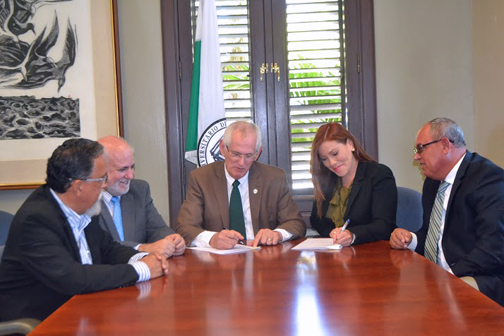Ag-Biotech Industry, UPR partner to benefit agronomists


From left: UPR-Mayagüez Deans Raúl Macchiavelli, Agricultural Sciences and Manuel Valdés Pizzini, RUM Arts and Sciences, John Fernández-Van Cleve, Beatriz Carrión, agronomist Ramon Molinary, vice president of PRABIA.
As Puerto Rico finds itself in the midst of furthering its role in the knowledge economy on a large scale, the Puerto Rico Agricultural Biotechnology Industry Association (PRABIA) and the Mayagüez campus of the University of Puerto Rico signed Tuesday a collaboration agreement that will benefit the agronomists that graduate each year.
The agricultural biotechnology industry contributes to the economic growth of Puerto Ricans and employs a large number of agronomy graduates from UPR-Mayagüez. The objective of this agreement is to further education and research in the agricultural biotechnology industry through initiatives that include the strengthening of academic curricula, the development of innovative technologies, and the hosting of conferences, symposiums, workshops, internships, and more.
“The development of the agricultural biotechnology industry is key to the planet’s present and future because it includes matters of vital importance, such as food security and production, health and nutrition, and famine in an ever-growing world,” said Beatriz Carrión, executive director of PRABIA.
“Puerto Rico plays a key role in these matters, and through this agreement we seek to combine efforts and increase knowledge in these areas by way of education and research. With the knowledge that RUM fosters and PRABIA’s focus, we are confident that this will be a successful endeavor,” she said.
Part of the agreement between PRABIA and RUM features efforts such as the participation of both parties as expert advisers in professional and academic committees; the development of updated curricula for courses offered at the College of Agricultural Sciences, incorporating new trends in the field; AgBio workshops for students and faculty; student access to the facilities of PRABIA member companies for research purposes; the development of a PRABIA scholarship program; the recruitment of students for employment at PRABIA member companies; internship programs, and more.
“As an educational institution, part of our mission is to establish ties with the industry that grants our students access to state-of-the-art processes and technologies,” said John Fernández-Van Cleve, rector of the UPR-Mayagüez. “This is especially so in matters related to agriculture, which are of great relevance to the development of our island.”












